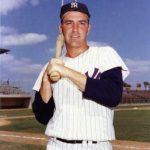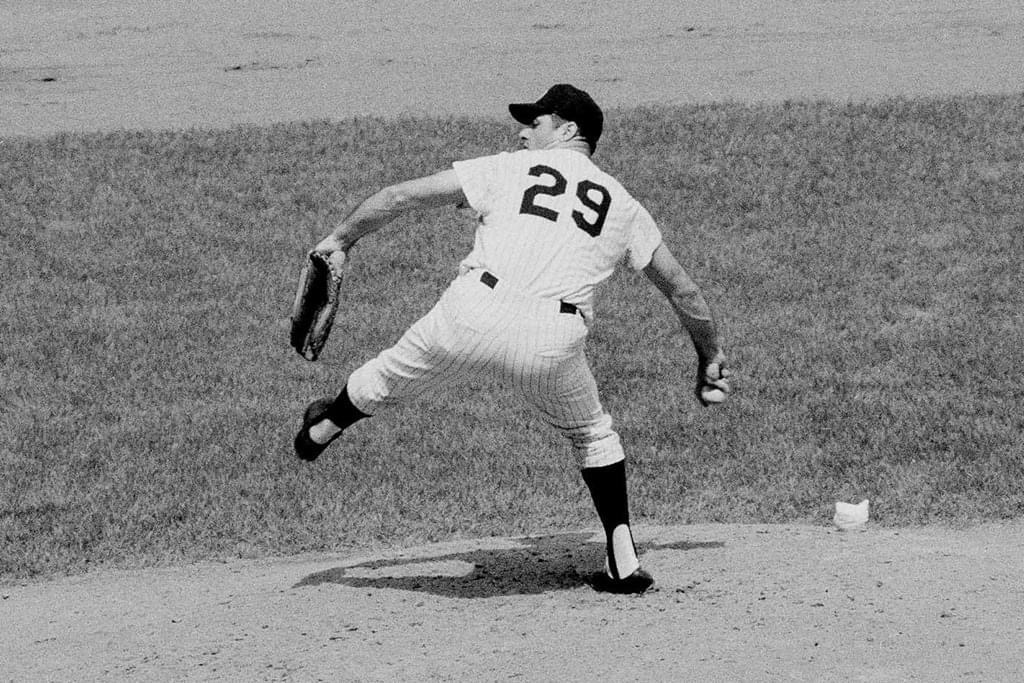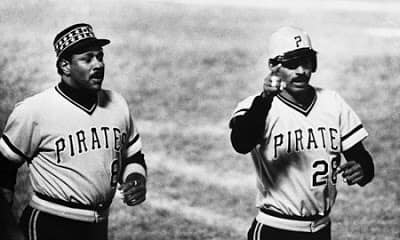Bill Robinson Stats & Facts
Bill Robinson
Positions: Outfielder, First Baseman and Third Baseman
Bats: Right • Throws: Right
6-2, 189lb (188cm, 85kg)
Born: June 26, 1943 in McKeesport, PA
Died: July 29, 2007 (Aged 64-033d) in Las Vegas, NV
Buried: Hillcrest Memorial Park, Hurffville, NJ
High School: Elizabeth Forward HS (Elizabeth, PA)
Debut: September 20, 1966 (Age 23-086d, 10,152nd in MLB history)
vs. STL 0 AB, 0 H, 0 HR, 0 RBI, 0 SB
Last Game: May 23, 1983 (Age 39-331d)
vs. LAD 1 AB, 0 H, 0 HR, 0 RBI, 0 SB
Baseball-Reference Page – Bill Robinson
Full Name: William Henry Robinson
Nicknames: Weaser
View Player Bio from the SABR BioProject
Bill Robinson was born in Elizabeth, PA and raised in McKeesport, just a few miles outside of Pittsburgh. In high school, he established himself as an outstanding baseball prospect. Former Pirate Bob Priddy, also a local product, once said, “The strongest arm I ever saw on a ballplayer belonged to Bill Robinson when he was playing in high school.” The Braves were obviously impressed as well and signed Robinson. He played well, steadily rising through the minors, but with the Braves well-stocked with talented outfielders like Hank Aaron, Rico Carty, Felipe Alou and Mack Jones, Robinson was made available when the New York Yankees offered slick-fielding thirdbaseman Clete Boyer in a trade. The Yankees hoped Robinson would become their next superstar, perhaps even the next Mickey Mantle, but Robinson struggled and was eventually traded to the Phillies.
After spending time in the minors, Robinson returned to the majors in 1972. He had a breakout year in 1973 with 25 homeruns and a .288 average, but the next year he was hurt and his numbers slid. Robinson became the odd man out in an improving Philadelphia outfield and was traded at the end of spring training, 1975 for Wayne Simpson, a one time hardthrowing phenom with the Reds who had pitched in the Pittsburgh organization with AAA Charleston in 1974, but was not about to make the Pirates in ’75.
Robinson was a valuable fourth outfielder in ’75, hitting .280 with six homeruns in 200 at bats. A torrid first half in 1976 which saw his average reach .350 in midseason, won the righthanded hitter more playing time. Bill hit three homeruns in an extra-inning game at San Diego on June 5, and with Richie Hebner having a poor season, Manager Danny Murtaugh got Robinson some extra playing time by placing him at thirdbase for 37 games. Additionally, Robinson played 78 games in the outfield and three at first. His versatility and excellent offensive contributions (a team high 21 homeruns and a season average of .303) led him to being named the team’s MVP inHis hits seemed to come when they were needed most as he helped the Pirates into contention by devastating the division’s eventual champion, his old team the Phillies. Robby hit .337 with four home runs and 16 rbi’s in 17 games against the Phils.
Robinson went to camp with a shot to be the everyday thirdbaseman in 1977, but while an excellent corner outfielder and capable in center, he had difficulty at the hot corner and the Pirates traded for Garner to “Phil” the hole left by Richie Hebner’s departure via free agency. While disappointed at again not having a regular position, Robinson went on the have his greatest season. His playing time increased when Willie Stargell was lost to the team in midseason and he finished as the club leader in homeruns with 26 and rbi’s with 104 while batting .304. His season highlights included two grand slams in three days, one a game winner. Playing more games at first than in the outfield, Robinson was steady in the field.
Robinson was finally rewarded by being given a regular position in 1978. His emergence as a hitter and the Pirates’ need for a proven top-notch starter were the reasons the Bucs were willing to part with Al Oliver and his .300 bat. Plagued by a thumb injury throughout the year, Robinson’s hitting was greatly affected. He batted only .246 with 14 homeruns and 80 rbi’s, but did finish fifth in the league with 36 doubles. Like his teammates, Robinson saved his best for last, hitting .290 with five homeruns and 20 rbi’s from September 4 through the end of the season.
Although overshadowed by some of his more dynamic teammates in 1979, the Pirates would not have won without Bill Robinson. Sharing more time in leftfield with John Milner, Robinson came back to hit 24 homeruns and drive in 75 while batting almost 80 times less than he had in ’78. In the Pirates’ division clincher against Chicago, he drove in two important runs and had three two homerun games during the year. His righthanded slugging helped balance a power attack led by lefthanded hitters Stargell and Dave Parker. Chuck Tanner would use him to replace Milner in left for defense late in games he had not already appeared in. This was the role he played in the NLCS as Cinci Manager Sparky Anderson started three righthanders against the Pirates.
It was a different story in the World Series. Robinson started Games 1, 3, 5 and 7 against Baltimore’s lefties, Mike Flanagan and Scott McGregor and appeared in the other three games as a pinchhitter and/or defensive replacement. His biggest hit of the Series was his sixth inning single in the seventh game which put him on base to score the tying run on Stargell’s homer.
Following the Series, the Pirates reportedly attempted to trade the 37-year-old to Houston for a young hard-throwing righthander, Joaquin Andujar, but the trade did not materialize. Robinson made Pirate fans happy about this on Opening Day 1980, when he hit a game-winning extra-inning homerun. An ankle injury and the emergence of Mike Easler and Lee Lacy cut into his playing time, but he hit .287 with 12 home runs.
Additional injuries and age continued to slow Robinson. He hit just .216 with 2 homers in 1981 and was traded back to the Phils in the middle of 1982. After retiring, Robinson became a batting coach and was the hitting instructor for the 1986 World Champion New York Mets. He has also done baseball analysis on TV and today is coaching hitters in the minor leagues, but he in Pittsburgh he will always be remembered as one of the quieter but more effective members of “The Family.”




